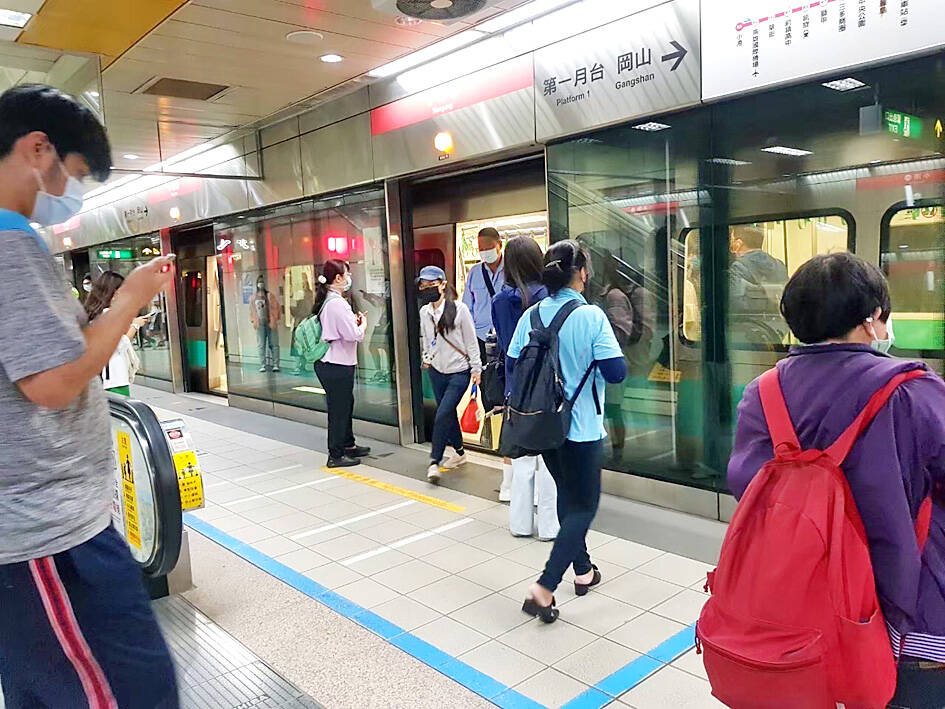Premier Su Tseng-chang (蘇貞昌) has approved a plan to build a new line on the Kaohsiung Mass Rapid Transit system, Democratic Progressive Party (DPP) Legislator Lai Jui-lung (賴瑞隆) said on Friday.
The new line is to run from Siaogang Station to Kaohsiung’s Linyuan District (林園), Lai said.
Construction might begin by the end of the year and the line could open as early as 2030, Lai added.

Photo courtesy of the Kaohsiung Rapid Transit Corp via CNA
Connecting the Red Line at its southern terminus, the “Siaogang-Linyuan Line” is to run underground until Linyuan 11th Park (林園11號公園) and overground for the rest of the line, he said.
It is to pass through 12 villages and serve 220,000 people, he said.
Lai said the government had been exploring the feasibility of the line for six years, and the plan was submitted to the Ministry of Transportation and Communications for review in December 2020, four months after Kaohsiung Mayor Chen Chi-mai (陳其邁) took office.
The plan passed an environmental impact assessment in July and was reviewed by the National Development Council last month before being submitted to the Executive Yuan for approval.
The 11.59km line is to have six underground stations and one elevated station, the plan shows.
The project’s budget is NT$53.312 billion (US$1.68 billion), it shows.
Without a connection to Kaohsiung’s metropolitan railway system, Siaogang (小港) and Linyuan districts have been beset with industrial pollution and road safety problems, Lai said.
Extending the Red Line was a major part of his political platforms when he ran for legislator six years ago, he said.
After taking office, he coordinated with the ministry and the Kaohsiung Mass Rapid Transit Bureau to promote the project, Lai said.
The original plan for the new line was an elevated light rail, but the agencies involved opted for an underground solution, citing a light rail’s low economic efficiency, and safer and more convenient services offered by a line that runs for the most part underground, he said.
The line might be further extended to Pingtung County’s Donggang Township (東港) to promote development in the two cities, he added.

The first global hotel Keys Selection by the Michelin Guide includes four hotels in Taiwan, Michelin announced yesterday. All four received the “Michelin One Key,” indicating guests are to experience a “very special stay” at any of the locations as the establishments are “a true gem with personality. Service always goes the extra mile, and the hotel provides much more than others in its price range.” Of the four hotels, three are located in Taipei and one in Taichung. In Taipei, the One Key accolades were awarded to the Capella Taipei, Kimpton Da An Taipei and Mandarin Oriental Taipei. Capella Taipei was described by

EVA Airways today confirmed the death of a flight attendant on Saturday upon their return to Taiwan and said an internal investigation has been launched, as criticism mounted over a social media post accusing the airline of failing to offer sufficient employee protections. According to the post, the flight attendant complained of feeling sick on board a flight, but was unable to take sick leave or access medical care. The crew member allegedly did not receive assistance from the chief purser, who failed to heed their requests for medical attention or call an ambulance once the flight landed, the post said. As sick

Minister of Economic Affairs Kung Ming-hsin (龔明鑫) yesterday said that private-sector refiners are willing to stop buying Russian naphtha should the EU ask them to, after a group of non-governmental organizations, including the Centre for Research on Energy and Clean Air (CREA), criticized the nation’s continued business with the country. While Taiwan joined the US and its Western allies in putting broad sanctions on Russia after it invaded Ukraine in 2022, it did not explicitly ban imports of naphtha, a major hard-currency earner for Russia. While state-owned firms stopped importing Russian oil in 2023, there is no restriction on private companies to

INDUSTRY: Beijing’s latest export measures go beyond targeting the US and would likely affect any country that uses Chinese rare earths or related tech, an academic said Taiwanese industries could face significant disruption from China’s newly tightened export controls on rare earth elements, as much of Taiwan’s supply indirectly depends on Chinese materials processed in Japan, a local expert said yesterday. Kristy Hsu (徐遵慈), director of the Taiwan ASEAN Studies Center at the Chung-Hua Institution for Economic Research, said that China’s latest export measures go far beyond targeting the US and would likely affect any country that uses Chinese rare earths or related technologies. With Japan and Southeast Asian countries among those expected to be hit, Taiwan could feel the impact through its reliance on Japanese-made semi-finished products and